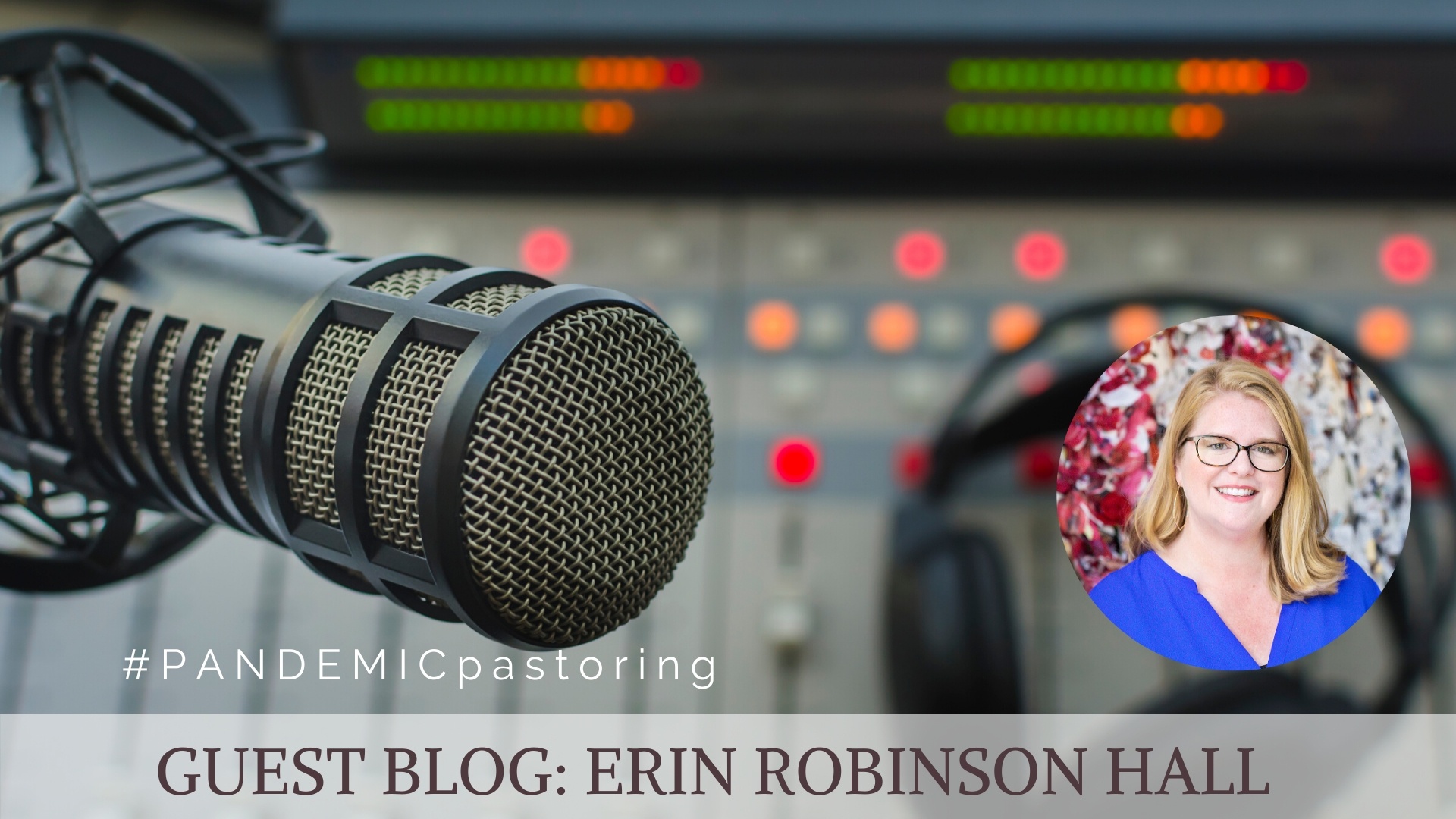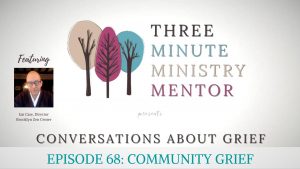You’re listening to podcasts while your feet hit pavement. Or while you hold the steering wheel. You’re listening at your laptop while your fingers carry out tedious parts of your work day. Or while you chop vegetables on the kitchen counter at home.
You are listening while you move.
Podcast listeners are tuning in to stories, conversations, self-help, comedians and sermons while we go about our regular lives. Which means, we are consuming content from a source outside our lives while we are in the very middle of our lives. We have a theological word for when something enters the living, breathing parts of life: incarnation. How can podcasts call us to recognize the creative power of incarnation?
I love a good podcast. I’ve listened to them, hosted and produced them, critiqued them, used them for teaching, and listened with my children. Most of us have our favorites (about seven podcasts per week, average) and we follow when new episodes will release.
Why does this matter for the practice of ministry?
Because we live in a time of digital connectivity. Digital connectivity, a term from media theorist Douglas Rushkoff, refers to the ways in which internet resources and social media permeate both society and how persons relate to one another.
It seems like connectivity would be such a needed thing in a time of social distancing. This may be one reason we love podcasts. But what does “community” mean in a society shaped by this kind of connectivity? When it comes to digital devices, the experience can be like what Rushkoff calls “digiphrenia.” The perceived necessity to keep pace with the onslaught of information available creates a “tension between the faux present of digital bombardment and the true now of a coherently living human.”
If we didn’t believe this before #pandemicpastoring, we know it now.
We are (faithfully and rightly!) distanced from in-person gatherings. We have Zoom Church, virtual gatherings and podcasts. These are a gift. And. Even as we are grateful for the opportunities that digital resources offer, we can name that technology can be exhausting. We can wonder which best practices will nourish and sustain a flourishing ministry.
Digital connectivity is not an accessory to ministry but a thread that weaves throughout the lives of most congregants. Rushkoff suggests that the context of “present shock” in digital connectivity is incompatible with the ways most institutions operate. “The ease with which we can now draw lines of connectivity between people and things is matched only by our need to find patterns in a world with no enduring story lines.”
The Church, however, claims both an enduring story line and an incarnate Christ.
And these days, we are doing so on a screen.
It feels shaky, at best. With one little square of someone’s face, we are supposed to feel present with our community. With voices recorded, we are supposed to trust the latest media platform to work correctly. With one touch of a button, voices mute. No choir processional, no offering plates, no paraments, no hugs. It feels like disembodied space, for a practice we have long recognized as embodied.
Not to mention the sense of chaos we feel. Creating moments that count as sacred takes work, filming, recording, editing, and producing in ways that feel canned. Then, as much as you may plan for people to consider one idea or experience, someone takes the Bible study discussion on a whole ‘nother rabbit trail.
Digital Church is a wild ride, y’all.
A few things that may tether us for the journey? Remembering what Christian educators have taught us as the three keys for technology and faith practices: relationality, contextuality and complexity. Start with the screens, but reach beyond them.
Mostly, we try not to get car sick. You know the feeling. You stare at a book or a screen inside a car, while the motion of the car is happening, fast. In our digital and virtual world, Rushkoff says we have to consider: “keeping an eye on a message as it spins round through today’s infinitely fast feedback loops” is not useful and leaves an organization dizzy. Why? Because “we are focused on the object instead of the motion.”
“We are focused on the object instead of the motion.”
The object these days is not the upholding of expectations and programs, but the movement that occurs when faithful practices, neighbors, and a community connect.
What do you do when you get carsick? Stop. Breathe. Pick up your eyes from the object and reorient yourself to the motion. What is happening, where are you, what can you see and touch? It’s adding complexity – textures and sounds and smells and embodied moments – to a flat experience.
You know why this may be just the right time to do this? Because of where you are. You are listening to podcasts while you run, cook, type, garden or drive. You’re experiencing church virtually while you sit on your couch, or patio or hiking path. For our practice of ministry these days, we must shape experiences that consider the ground people are walking, the grief they are holding, and the spaces where they are living.
Are you feeling a little nauseous with the digital connectivity? Take a deep breath, look out the windshield for a minute. Consider a few guidelines for using podcasts and virtual experiences. How could these work in your practice of ministry?
1. Allow image to shape pathways of imagination. Imagination can move a person from familiar images to the risky work of transformation. Begin with images from worship and ministry settings that are recognizable. Call upon the memory of familiar experiences to bolster the encoding that occurs in the learning experience. use imagery and sensory experiences to guide learners towards imagination.
- Invite complexity to address “sensory conflict.” How could we include moments of response? How can we invite people to share their exact experience while using a digital resource? Listen for differing voices. What would this sound like if read by the voice of ________? If seeing and hearing matter in our digital resources (and they do) what background sounds could add to what we are recording here? What backgrounds and sights would matter to my faith community?
- Make choices for your particular context. Decision making is one of the hardest tasks these days. You can indeed find a wealth of brilliant resources that require little preparation and can offer something meaningful. Sometimes, however, a minister must recognize the particular needs of a community that require a uniquely designed resource and use creativity to weave the priestly and prophetic together. Ministers, trust your training and theological instincts, and decide boldly.
- Take risks.
- Stir imagination to transform practices.
<
p style=”text-align: center;”>+ + + + + + + + + + +
Season 2 of 3MMM Podcast
We decided to take some risks in this season of 3MMM.
Season 2 of Three Minute Ministry Mentor was designed to feature special guests each month. This season is an absolute treasure of gifted ministers sharing from their theological areas.
As the global pandemic unfolded, we realized that pandemic grief had settled around us. How could we offer space to talk through this reality? Eileen decided to pivot and began recording a series of Conversations on Grief. It was a risk, to stop and reshape the plans we had made for this spring.
But if we are talking about incarnation . . . being mindful of where our 3MMM community is doing life these days means that we recognize — grief touches us all.
Have a listen to Season Two
You’ll hear Rev. Dr. Beverly Wallace in Episode 57: Caring for Grief in a Pandemic. In these pandemic days, she sees the essential and ongoing needs for advocacy and liberation, two of the central purposes of pastoral care. She reminds us that this season of isolation, grief and loss also amplifies disparities and inequities for our African American neighbors. Hear about the rituals we all need, and the questions that Dr. Wallace says we need to be asking in this time of pandemic grief. 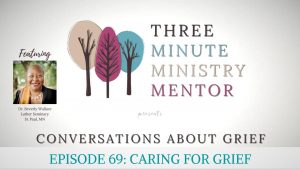
You’ll hear Ian Case, Director of the Brooklyn Zen Center in Episode 56: Community Grief
Ian names the fact that our virtual gatherings require a “stripping away of ritual and form.” The members of the Zen Center invite complexity by meeting for Dharma talks (educational teaching), services of meditation, and practice groups in online platforms. Listen to this conversation about establishing community intimacy, the importance of community agreements, and coping with community grief.
Listen to Rev. Mary Elizabeth Hanchey of Project Pomegranate in Episode 55: Fertility Grief. Mary Elizabeth tells us about how to offer compassionate care for complicated losses. She tells us: “Grief that accompanies the season of Mother’s Day and Father’s Day is always complicated for those whose lives have been touched by fertility grief.” Listen and hear what faith communities can offer people who experience fertility grief. 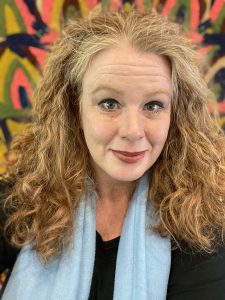
We also featured some remarkable voices in theological education. Hearing their voices now brings another layer of understanding to these days of pandemic ministry.
Rev. Dr. Mary Moschella reminds us that listening matters. It matters for pastoral practice as well as personal relationships and every part of our lives. Listening is intimately connected to paying attention to life with all of our senses.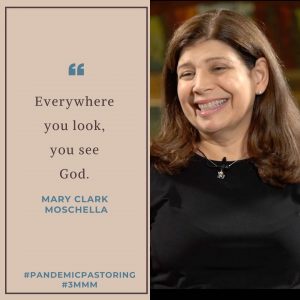
Rev. Dr. Danielle Tumminio Hansen takes us from Harry Potter theology to walking alongside her friend’s infertility journey. She explores what embodied theology looks like in the #practiceofministry and what #purposefulrest has looked like for her.
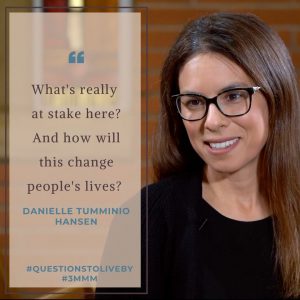 Rev. Dr. Eric Barreto got us thinking about imagination. His words from earlier this year have profound meaning in our pandemic reality — “It’s not just about reading a text, it’s about reading a text in the midst of a community. . . it means listening to what is going on in the world.”
Rev. Dr. Eric Barreto got us thinking about imagination. His words from earlier this year have profound meaning in our pandemic reality — “It’s not just about reading a text, it’s about reading a text in the midst of a community. . . it means listening to what is going on in the world.” 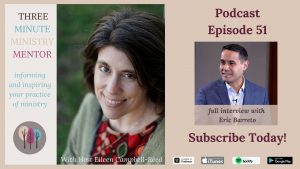
What about you? What podcast episodes have offered you a compelling story, a laugh or a new idea? Share them with us?
We would love to have some great podcast episodes to add to our Pandemic Pastoring Resource page or our Pandemic Grief page.
Keep listening, friends.
<
p style=”text-align: center;”>+ + + + + + + + + + + + + + + +
Rev. Dr. Erin Robinson Hall is a writer, podcaster, retreat leader, and preacher who works in developing resources, curating content, ministry consulting, and designing experiences for spiritual formation. She and her husband Jake live with their young children in Macon, Georgia.

